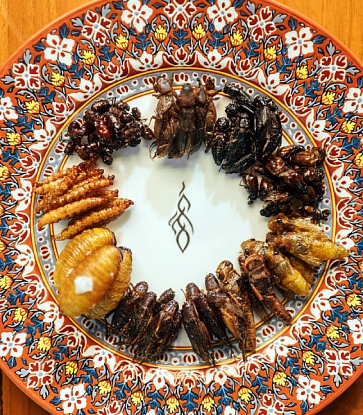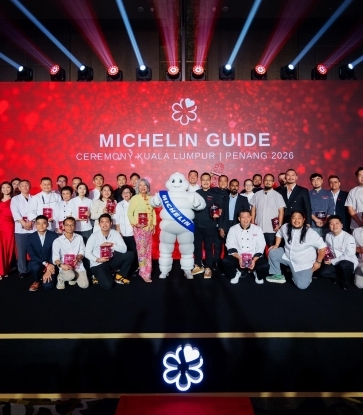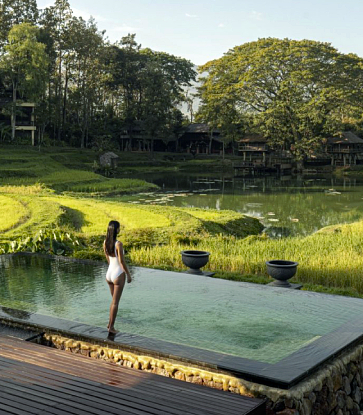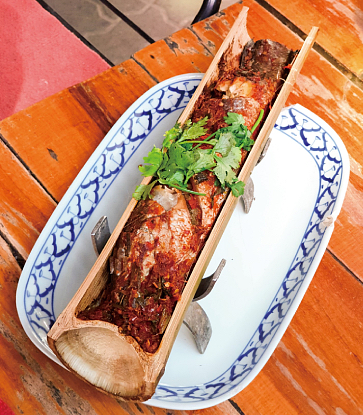Food and fashion have plenty in common, says Hans Christensen. And he should know. Before he founded Ginger, the Dane spent years as a menswear fashion designer, including a five-year stint in London.
“For the restaurant business, just like in fashion, you need to have all the ingredients in place, including the ambience, service, and product,” he adds.
For anyone that has eaten at any of Ginger’s restaurants in Chiang Mai – including The House by Ginger and Ginger Farm Kitchen, both awarded Bib Gourmand recipients in the 2021 MICHELIN Guide Thailand, it would certainly seem this has always rung true.

The House by Ginger
Around the same time the first Ginger shop opened in Chiang Mai (selling fashion accessories and homeware in the brand’s now-signature bold patterns and colours), Christensen noticed a beautiful colonial house within the city’s old town falling into neglect. He tracked down the owner, and just like the colony of cats that had commandeered the home in its years of disuse, he immediately connected with the space.
“Perhaps it reminded me a bit of Europe, and how I grew up,” says Christensen, who later learned that it was built by a Danish trading company in 1937.
The house may have immediately felt right, but he recalls a tough few years for his first restaurant with the original fusion concept dubbed “con-fusion” by local diners. The menu then evolved to include more classic Western dishes such as pasta and steak, but that changed again about five years ago to cater to the growing number of visitors from Asian countries, who preferred to experience the local Thai food.

Today, Ginger’s culinary concept offers authentic Thai flavours cooked with traditional techniques, like the khao soi (northern style noodle curry), albeit sometimes with a twist, like the pla scallop (seared Japanese scallops in coconut-chilli dressing).
“We have a good team of chefs, and we often develop ideas together,” says Christensen, who admits he has an inordinate number of recipe books. “We go to local markets, try different food, and with many of our staff from Burmese hill tribes, I often ask them to cook something from their village to see if we can adapt it for the general palate.”
Christensen’s sense of the market and willingness to adapt paid off. On the first day they opened Ginger Farm Kitchen at One Nimman a few years later, they sold out within four hours of opening.

Organic Ginger Farm
On Thai Mother’s Day six years ago, Christensen’s Thai business partners – Siriluck and Thongchai Paritanung – invited their friends and families to a farm they had bought in Saraphi, close to the Ginger office. They arranged for activities to show the children how rice is harvested as well as other aspects of farm life.
Word spread fast, and soon after, other parents started inquiring about visiting the farm. Then a few months later, the farmhouse was transformed into a café and today, visitors to the farm can enjoy a number of activities including feeding the animals, collecting eggs, and going on a farm tour learning about different crops and how they are planted.
It was this farm concept that gave the Ginger team the idea to bring the farm to the city, and to focus on sourcing organic vegetables and free-range ingredients whenever possible.

“For small farmers, it is almost impossible to get formally accredited as organic considering the list of requirements,” says Christensen. Instead, they developed their own certification system to help local farmers around Northern Thailand grow the type of produce required at the restaurants, supplementing the five to 10 percent of produce sourced from Ginger Farm.
The company also recently partnered with Maejo University with the university’s agricultural department growing figs, strawberries, artichokes, and other produce on demand, which Ginger would then purchase at market price.

The next collection
“This past year, we had to say goodbye to a lot of our staff, which was really hard,” says Christensen.
The impacts of the pandemic on travel, however, gave them the time to rethink, to work on staff training, team building, and develop new products. “We are trying to get something positive out of it, and come out stronger in many ways.”
The team is currently working on plans to add a homestay element to Ginger Farm, and to get the massage ladies from the local village involved with the farm experience.
In addition, they are continuing to develop restaurants (including more in the pipeline to be rolled out in China over the coming years). With their certified-for-export factory ready to go, they will also be sending ready-to-eat food products, such as dried fruit and homemade chilli pastes, to overseas markets.
“As they say in the fashion industry, you are only as good as your last collection,” says Christensen. “So we just have to keep going.”
Hero photos: © Tina Hsiao / MICHELIN Guide Thailand, The House by Ginger




















